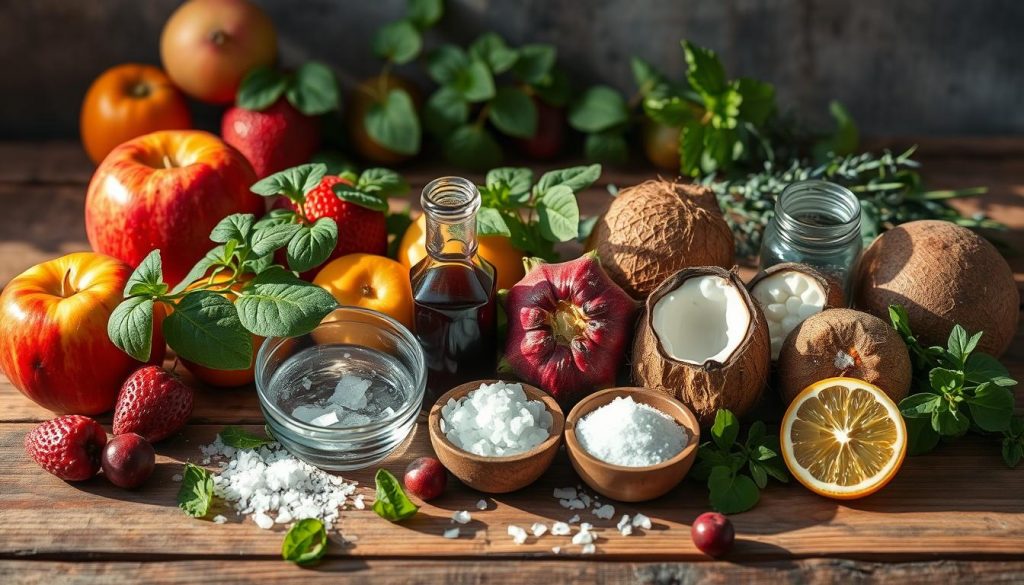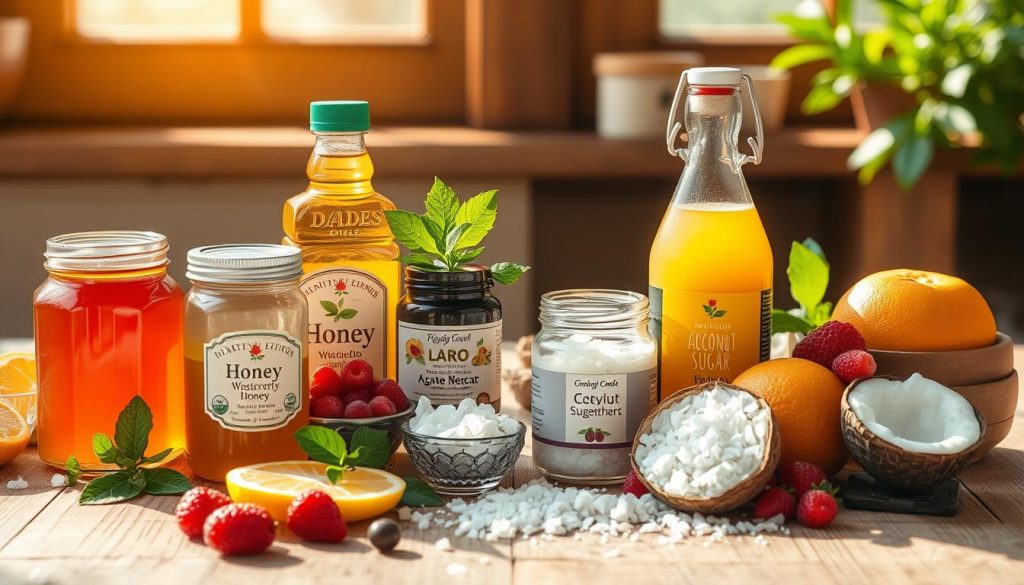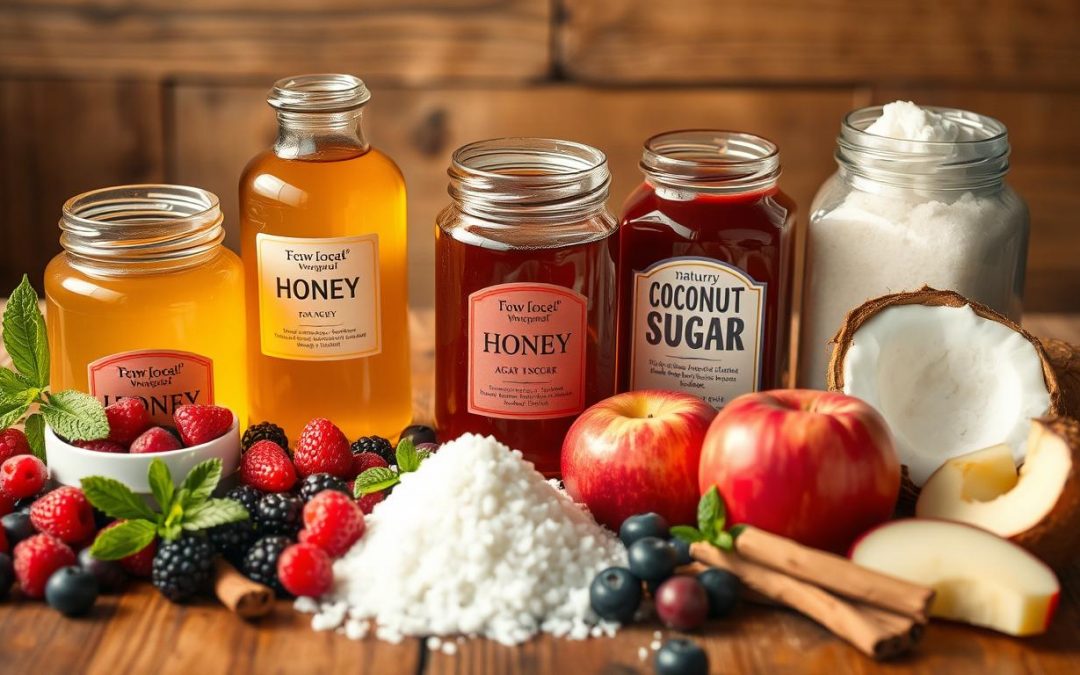Are healthy sweeteners a good choice instead of sugar? It’s key to know the difference between natural and added sugars. They affect our bodies in different ways. You can learn about healthy sweeteners to make smart choices. Artificial sweeteners are much sweeter than sugar1. The FDA has approved five artificial sweeteners: Saccharin, Aspartame, Neotame, Sucralose, and Acesulfame2.
We’ll dive into the world of healthy sweeteners. This includes natural sweeteners and sugar alternatives. We’ll look at their benefits and risks. The World Health Organization (WHO) says aspartame is safe up to 40 mg/kg of body weight per day1. Stevia, a natural sweetener, is also FDA approved2.
Table of Contents
Key Takeaways
- Healthy sweeteners can be a good choice instead of sugar, but it’s important to know their effects.
- Artificial sweeteners are much sweeter than sugar1.
- Natural sweeteners, like Stevia, are FDA approved and can be a low-calorie option2.
- The WHO has guidelines for aspartame consumption, and it’s essential to follow them1.
- High sugar intake can cause health problems like diabetes and heart disease2.
- Healthy sweeteners, including natural and sugar alternatives, can be part of a balanced diet when used in moderation.
Overview of Healthy Sweeteners
Choosing between sugar and sweeteners is a common dilemma. We need to know the benefits and drawbacks of sweeteners in our diets. Healthy sweeteners come in different types, including sugar substitutes. These substitutes taste sweet but have fewer calories than sugar, and some have no calories at all3.
Understanding the impact of sweeteners on our health is key. The American Heart Association suggests limiting added sugar. Natural sweeteners, seen as healthier, also add to our sugar intake4. We must consider their low-calorie benefits against their possible metabolic effects3.
Definition and Types of Sweeteners
Sweeteners fall into natural, sugar substitutes, and artificial categories. Natural sweeteners, like stevia, come from plants. Artificial sweeteners, such as aspartame and sucralose, are made in labs4. Knowing these differences helps us make better diet choices.
Purpose and Uses in Diets
Sweeteners add sweetness without calories. But, we should think about their effects on our health3. As we explore healthy sweeteners, focusing on whole foods is key. This helps us use fewer added sweeteners.
For more on healthy sweeteners, check out cooking tips and reviews. They discuss the pros and cons of different sweeteners5.
| Sweetener Type | Calorie Content | Potential Drawbacks |
|---|---|---|
| Natural Sweeteners | Varies | Contribute to overall sugar intake |
| Artificial Sweeteners | Zero-calorie | Potential metabolic effects |
Pros of Using Healthy Sweeteners
Healthy sweeteners offer many benefits, like being low in calories and rich in nutrients. Artificial sweeteners are much sweeter than regular sugar, being 200 to 13,000 times sweeter6. On the other hand, natural sweeteners like stevia and monk fruit are better for us. They have more vitamins, minerals, and antioxidants than regular sugar.
Healthy sweeteners have several advantages:
- Low-calorie options: Stevia is incredibly sweet, needing only a tiny amount to sweeten7.
- Nutrient-rich alternatives: Coconut sugar has less sucrose and is packed with vitamins like C and B vitamins7.
- Natural vs. synthetic sweeteners: Natural sweeteners, though added sugars, have antioxidants, vitamins, and minerals6.
When picking the best sweeteners for health, weigh their pros and cons. Choosing natural sweeteners over artificial ones can help avoid health issues from too much sugar7. Exploring healthy sweeteners helps us make better choices for our health and wellbeing.
Cons of Healthy Sweeteners
Healthy sweeteners have many benefits, but they also have some drawbacks. One major concern is the health risks they can pose8. For example, natural sweeteners can taste sweeter in smaller amounts than sugar. Yet, some people find they leave a lasting aftertaste8.
Mixing different natural sweeteners can help reduce aftertaste and stomach discomfort8.
Another big issue is how sugar substitutes affect our taste. Eating a lot of artificial sweeteners can make us want even sweeter foods and drinks9. This can lead to weight gain and health problems like type 2 diabetes1.
Some major downsides of sugar substitutes include:
- Potential health risks, such as an increased risk of kidney cancer in postmenopausal women1
- Impact on taste preference, leading to increased cravings for sugary foods and drinks9
- Digestive issues, such as gas or bloating, when eating plant-based natural sweeteners8
It’s important to know these drawbacks and use sugar substitutes in moderation8. By understanding both the good and bad sides of healthy sweeteners, we can make better choices for our diet and lifestyle.
Popular Healthy Sweeteners on the Market
Let’s explore the world of natural sweeteners and sugar alternatives. We’ll look at the popular ones available. You’ll learn about their benefits, uses, and possible drawbacks.
Stevia, erythritol, and monk fruit are well-known natural sweeteners10. They’re popular because they’re low in calories and might be good for your health. For example, stevia is 250 times sweeter than sugar and has no calories11.
Here are some key characteristics of these popular healthy sweeteners:
- Stevia: 250-300 times sweeter than sugar, zero calories10
- Erythritol: contains approximately 0.24 calories per gram, does not spike blood sugar or insulin levels10
- Monk fruit: free of calories and carbohydrates, may aid in better blood sugar management10
When picking a natural sweetener or sugar alternative, think about your health. Choose products that are low in calories and full of nutrients. Remember, it’s important to keep your sugar intake in check12. By making smart choices, you can enjoy natural sweeteners while staying healthy.
How to Incorporate Healthy Sweeteners in Your Diet
There are many ways to add healthy sweeteners to your meals. You can use fruit puree as a sweetener. This blends ripe fruits into a mix that’s full of fiber, nutrients, and water13. It’s a great way to cut down on sugar and choose better options.
Choosing the right sweetener is key. Look at how many calories it has, its nutritional value, and any health risks. For instance, sugar substitutes like aspartame and sucralose are very sweet but have almost no calories14. But, some studies suggest they might have downsides, like a possible link to liver cancer13.
It’s important to know about the different healthy sweeteners out there. This includes natural ones like stevia, agave, and monk fruit, as well as sugar alcohols like xylitol and erythritol15. By understanding these, we can pick the best ones for our health and cut down on added sugars.
Some sweeteners, like honey and maple syrup, have good nutrients along with natural sugars14. Others, like fruit juice and molasses, give us important vitamins and minerals while we use less added sugar13. By trying these out and finding the healthiest options, we can improve our health.
The Role of Healthy Sweeteners in Weight Management
Sugar substitutes and low glycemic sweeteners are key in weight management. They help us cut down on calories. Research shows that cutting out all sugar might mean missing out on nutrients from fruits, whole grains, and dairy16. So, finding the right balance is vital.
Managing weight also means controlling hunger and sweet cravings. Sugar substitutes and low glycemic sweeteners can help with this. For instance, stevia is safe and effective, with a glycemic index of 017. It’s great for those trying to lose weight and eat less sugar.
Studies suggest that switching to non-nutritional sweeteners can help kids lose weight16. But, the World Health Organization advises keeping free sugar intake under 10% of total energy, ideally under 5%18. Making smart choices about sweeteners and watching our sugar intake can help us manage our weight effectively.

Success in weight management comes from finding a balance that suits you. Using sugar substitutes and low glycemic sweeteners can help reduce calories and sweet cravings. This way, you can enjoy a healthy and balanced lifestyle.
Allergies and Sensitivities to Consider
When using artificial sweeteners and sugar substitutes, it’s key to think about allergies and sensitivities. Some people might react badly to certain sweeteners, with reactions ranging from mild to severe19. Sweeteners like saccharin, aspartame, and sucralose are often found in “reduced sugar” or “diet” products19.
Some folks use sugar substitutes, which taste sweet but have fewer calories20. But, it’s important to know the risks, like a higher chance of type 2 diabetes and high blood pressure19. Many people look for sugar-free options because they can’t handle regular sugar well, and more people are learning about this21.
It’s a big deal to not overdo it with sugary foods, whether they’re natural or artificial21. Getting tested for sugar intolerance is a good idea before making big changes in your diet21. Knowing about these allergies and sensitivities helps people make better choices about what they eat.
Common Allergens in Sweeteners
- Saccharin
- Aspartame
- Sucralose
These sweeteners can cause a range of symptoms, from mild discomfort to severe reactions19. It’s really important to know the risks of eating them19.
Healthy Sweeteners in Beverages and Snacks
We often look for ways to make our beverages and snacks healthier. Using natural sweeteners like honey and stevia is a good option. These sweeteners add sweetness without the negative effects of refined sugar22. shows that artificial sweeteners can cut daily calorie intake by replacing sugary drinks.
There are many healthy sweeteners for beverages. For coffee and tea, honey or stevia can add sweetness without calories. For treats, erythritol or monk fruit can reduce sugar content23. notes that while these sweeteners don’t make a product healthy, they can help lower sugar intake and tooth decay risk.
Here are some popular natural sweeteners used in beverages and snacks:
- Honey: a natural sweetener with a high moisture content and varied nutritional profile24
- Stevia: a low-calorie sweetener that is approximately 50-300 times sweeter than sugar22
- Monk fruit: a natural sweetener that is low in calories and rich in antioxidants
In conclusion, using healthy sweeteners in beverages and snacks is a great way to reduce sugar intake. By choosing natural sweeteners like honey, stevia, and monk fruit, we can add sweetness without the negative effects of refined sugar23. and22 suggest these sweeteners can help reduce calorie intake and lower tooth decay risk, making them a great option for healthier choices.

| Sweetener | Calories per tablespoon | Glycemic Index |
|---|---|---|
| Honey | 64 | 30-74 |
| Maple syrup | 54 | 54 |
| Agave nectar | 60 | 10-30 |
Understanding the Glycemic Index of Sweeteners
Choosing the right sweeteners is key to managing blood sugar levels. Low glycemic sweeteners, like sugar substitutes, help keep blood sugar stable. The glycemic index (GI) score shows how fast blood sugar rises after eating. Scores under 55 are low, and over 70 are high25.
Sweeteners with more fructose tend to have a lower GI. This makes them better for people with diabetes or those watching their blood sugar25. Honey and coconut sugar have a lower GI than white sugar but can raise blood sugar levels26. It’s best to pick low-GI sweeteners like stevia or monk fruit for healthy blood sugar.
There are many alternatives to sugar. Some popular ones include:
- Stevia: a natural sweetener with a low GI
- Monk fruit: a low-calorie sweetener with a low GI
- Coconut sugar: a low-GI sweetener with fewer calories than white sugar
Gluten-free snacks are also good for blood sugar management. By picking low-GI sweeteners and watching carb intake, you can keep blood sugar healthy and lower disease risk.
Knowing the glycemic index of sweeteners is vital for healthy blood sugar. By choosing low-GI sweeteners and controlling carbs, you can manage your health and lower disease risk25. For more on healthy sweeteners and sugar substitutes, visit our website. Learn how to make smart diet choices26.
| Sweetener | Glycemic Index |
|---|---|
| White Sugar | High |
| Coconut Sugar | Low |
| Stevia | Low |
Future of Healthy Sweeteners in Nutrition
The world of healthy sweeteners is changing fast. People want natural sweeteners and options with fewer calories. As more folks focus on health, the industry is creating new, healthy sweeteners for different diets. Low-calorie sweeteners are up to 20,000 times sweeter than sugar, making them a good choice for those watching their sugar intake27.
Stevia and monk fruit are becoming more popular. They’re low in calories and might be good for your health. The FDA has okayed many artificial sweeteners, but some research shows risks. For example, erythritol might raise the risk of heart attacks and strokes2829.
It’s important to keep up with new info and research. By picking healthy sweeteners and watching our sugar, we can improve our health. Whether you like natural sweeteners or artificial ones, there’s something for everyone.
- Check the ingredient label for artificial additives and preservatives
- Opt for natural sweeteners like stevia and monk fruit
- Be mindful of your sugar intake and choose low-calorie alternatives
Conclusion: Making Informed Choices
Exploring healthy sweeteners shows we need to think carefully about natural and artificial options30. Artificial sweeteners are low in calories, helping with weight and blood sugar control. Yet, they might pose health risks that need more study30. Natural sweeteners like stevia31, monk fruit31, and xylitol31 are calorie-free or low-calorie. They also have trace nutrients, but we need to learn more about their effects on digestion and health.
Choosing between natural and artificial sweeteners depends on personal taste, health, and diet32. It’s important to remember that too much of any sweetener, natural or artificial, can harm our health30. By staying informed, checking labels, and trying different sweeteners, we can find a balance. This balance supports our health while satisfying our sweet tooth.
FAQ
What are healthy sweeteners?
What are the different types of healthy sweeteners?
What are the benefits of using healthy sweeteners?
What are the possible drawbacks of healthy sweeteners?
What are some popular healthy sweeteners on the market?
How can I incorporate healthy sweeteners into my diet?
How do healthy sweeteners affect weight management?
What are the possible allergies and sensitivities to consider with healthy sweeteners?
How can I use healthy sweeteners in beverages and snacks?
How does the glycemic index of sweeteners impact health?
What is the future of healthy sweeteners in nutrition?
Source Links
- Are Artificial Sweeteners Bad for You? – https://www.verywellhealth.com/artificial-sweeteners-5184450
- Sugar vs. Artificial Sweeteners: The Pros and Cons – https://blog.vendinggroup.com/sugar-vs.-artificial-sweeteners-the-pros-and-cons
- WHO advises not to use non-sugar sweeteners for weight control in newly released guideline – https://www.who.int/news/item/15-05-2023-who-advises-not-to-use-non-sugar-sweeteners-for-weight-control-in-newly-released-guideline
- Artificial vs. natural sweeteners: The inside scoop on sugar substitutes – https://www.gundersenhealth.org/health-wellness/eat-move/artificial-vs-natural-sweeteners-the-inside-scoop-on-sugar-substitutes
- Exploring the Healthiest Sugar Alternatives: A Comprehensive Guide to Types of Sweeteners – https://foodrevolution.org/blog/sugar-substitutes/
- The Great Debate Between Artificial & Natural Sweeteners – Obesity Action Coalition – https://www.obesityaction.org/resources/the-great-debate-between-artificial-natural-sweeteners/
- Are ‘Natural’ Sweeteners Healthier Than Sugar? – https://www.uhhospitals.org/blog/articles/2022/08/are-natural-sweeteners-healthier-than-sugar
- Advantages And Disadvantages Of Natural Sweeteners – https://www.skinnymixes.com/blogs/health/advantages-and-disadvantages-of-natural-sweeteners?srsltid=AfmBOophf2iTkiTb39JhqmjfQsGyaJDYvP2AI4r5M0aqQfoOppez5fS6
- Chronic Use of Artificial Sweeteners: Pros and Cons – PubMed – https://pubmed.ncbi.nlm.nih.gov/39339762/
- 5 Natural Sweeteners That Are Good for Your Health – https://www.healthline.com/nutrition/healthy-natural-sweeteners
- The Best and Worst Artificial Sweeteners for Your Health – https://www.health.com/best-and-worst-artificial-sweeteners-7974926
- Best (and Worst) Ways To Sweeten Your Food – https://health.clevelandclinic.org/best-and-worst-sugar-substitutes
- The Pros and Cons of Sugar Substitutes – https://www.adventhealth.com/blog/pros-and-cons-sugar-substitutes
- Facts About Sugar and Sugar Substitutes – https://www.hopkinsmedicine.org/health/wellness-and-prevention/facts-about-sugar-and-sugar-substitutes
- Pros and cons of artificial sweeteners – https://www.mayoclinic.org/healthy-lifestyle/nutrition-and-healthy-eating/in-depth/artificial-sweeteners/art-20046936
- Chronic Use of Artificial Sweeteners: Pros and Cons – https://www.mdpi.com/2072-6643/16/18/3162
- No, Natural Non-Sugar Sweeteners Aren’t Better Than Sugar for Weight Loss. Dietitians Share Their Pros and Cons – https://www.loseit.com/articles/no-natural-non-sugar-sweeteners-arent-better-than-sugar-for-weight-loss-dietitians-share-their-pros-and-cons/
- The Impact of Artificial Sweeteners on Body Weight Control and Glucose Homeostasis – https://pmc.ncbi.nlm.nih.gov/articles/PMC7817779/
- Sweet As . . . Sucralose: The Pros and Cons of Artificial Sweeteners – https://extension.usu.edu/nutrition/research/sweet-as-sucralose-the-pros-and-cons-of-artificial-sweeteners
- The Impact of Artificial Sweeteners on Human Health and Cancer Association: A Comprehensive Clinical Review – https://pmc.ncbi.nlm.nih.gov/articles/PMC10822749/
- Natural Sugars Vs Artificial Sweeteners -Test My Allergy – https://www.testmyallergy.com/blog/natural-sugars-vs-artificial-sweeteners/?srsltid=AfmBOoqJgb5FXA6KbbEWUsKvwE92hoR398WjzaDEw5FNvACSLb7OvTW5
- Artificial vs. Natural Sweeteners: Weighing the Health Benefits and Risks – https://drinkpax.com/blogs/news/artificial-vs-natural-sweeteners-benefits-and-risks?srsltid=AfmBOooA_8hAdm2zx0rTSbMmounz5F3B0JB_ocHhFIfIKNj9Bt8IU5qb
- The truth about sweeteners – https://www.nhs.uk/live-well/eat-well/food-types/are-sweeteners-safe/
- Chronic Use of Artificial Sweeteners: Pros and Cons – https://pmc.ncbi.nlm.nih.gov/articles/PMC11435027/
- Sweeteners And Their Glycemic Index: A Comparison – HealthifyMe Blog – https://www.healthifyme.com/blog/sweeteners-and-their-glycemic-index/
- Sweeteners – Living Well at Texas A&M – https://livingwell.tamu.edu/sweeteners/
- Low-Calorie Sweeteners – https://nutritionsource.hsph.harvard.edu/healthy-drinks/artificial-sweeteners/
- Foodsmart Nutrition & Dietitian Advice Blog | Healthy Habits – https://foodsmart.com/blog/20140407artificial-sweeteners-pros-cons-and-alternatives
- Are You Risking Your Health Using Artificial Sweeteners? – https://my.clevelandclinic.org/podcasts/health-essentials/nutrition-essentials-are-you-risking-your-health-using-artificial-sweeteners
- From Sugar to Substitutes: Understanding the Advantages and Disadvantages of Artificial Sweeteners – https://vocal.media/humans/from-sugar-to-substitutes-understanding-the-advantages-and-disadvantages-of-artificial-sweeteners
- Pros and Cons of Different Natural Sweeteners – https://www.thrivingtaste.com/natures-sweet-secrets/the-pros-and-cons-of-different-natural-sweeteners/
- What are the Artificial Sweeteners | Dr. Vaishali Pathak – http://sahyadrihospital.com/blog/artificial-sweeteners-dr-vaishali-pathak/

